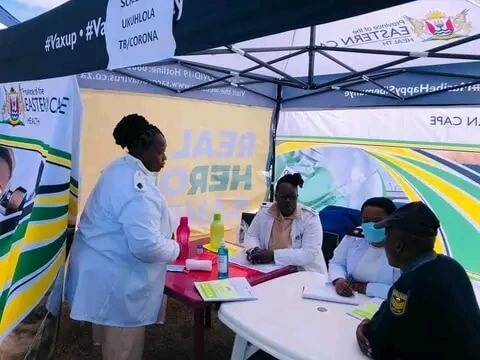Mthatha women are proving that the construction industry knows no gender boundaries. They have seized opportunities created by the South African National Roads Agency SOC Limited’s (SANRAL) upgrade of the 27-kilometre section on the R61 route from Baziya to Mthatha Airport.
Sivuyile Joyi is a 34-year-old mother who manages a joint venture, Phindungene – Lonubanzi JV, which was awarded a R4.1-million contract for kerbs during the construction phase of the R61.
SANRAL awarded the R61 contract to H&I Construction for an amount of R238-million in 2021 after the previous contractor abandoned the project in 2018 and was subsequently liquidated.
The R61 is a key strategic route which joins the Eastern Cape to the N1 towards the Western Cape, and to the N6 towards the Free State and Gauteng. On the Eastern side, it links with the N2 to KwaZulu-Natal and is also a key link to the N2 Wild Coast Road.
The project’s scope comprised road widening, creating auxiliary lanes, improving safety at intersections along the route, upgrading some bridges and the construction of agricultural underpasses for the movement of livestock to not disrupt the traffic flow.
The R61 brings many benefits for the Mthatha community, which has been earmarked by the Eastern Cape government for the development of the Wild Coast Economic Zone. SANRAL is upgrading the route to meet logistics demands.
When H&I Construction awarded subcontracts to 44 local small, medium and micro enterprises (SMMEs), Joyi’s Phindungene and Lonubanzi JV was among the local SMMEs awarded subcontracts.
The targeted enterprise goal was 30%, but the project exceeded that by achieving 38% and doubled the 8% labour target and registered 16%.
Although Joyi’s initial subcontract was R4.1-million, its value went up as her company was allocated more concrete work such as the construction of bus bays, grass blocks, mountable kerbs, edge beams and energy breakers.
“My involvement in this project has changed my life completely. My passion for construction grew and it gave me the drive to want to grow in the construction industry and to want my company to be like H&I Construction soon,” she said. “I started on this project as a Grade One CIDB contractor but after getting my completion certificate from H&I Construction, I will be a Grade 4 CIDB.”
Joyi’s company employed at least 10 people during the project. She also bought herself a bakkie. Her company’s participation in the SANRAL project has already opened doors to new opportunities in the local municipality.
“I was awarded another opportunity by a local municipality, and I will complete this project beforehand because of the skills I acquired during my time on the SANRAL project. My knowledge of the field has grown tremendously, and it gave me time management and planning skills, enabling me to complete tasks efficiently and timeously,” she said.
The ambitious mother of two said when she lands a similar contract in future, she’s going to purchase construction machinery. Her goal is to turn Phindungene – Lonubanzi JV into a construction force to be reckoned with.
“I am driven by the fact that many people think as a woman I can’t do it. Phindungene -Lonubanzi JV strives to compete with the big five companies currently leading the construction industry in South Africa, but as a woman led entity. With the right mentorship, training and hard work, this will be attainable,” said Joyi.
Another trail-blazing woman, Unathi Mqhagi, joined the project as a hard labour employee making gabions, but while working she established her own company, Jama Suppliers, which is now contracted to install gabions on the project route.
As a startup company, Mqhagi’s Jama Suppliers was awarded a contract of R600 000, but it was later revised and lowered to a workload that she could cope with.
“When I joined the project last year I saw many opportunities, apart from installing gabions. I saw that I could install water drainage, install kerbs and other concrete work,” she said. “I was also inspired by seeing a young woman being a director. I then thought to myself, I’m still 36, why don’t I use the money that I’m earning to start my own company and grow?”
After registering her own company, Mqhagi was awarded a subcontract. “I was able to employ four people – one of them is disabled – to make and install gabions. My company is just a year old, and we are still working on site,” she said.
Mqhagi is hoping there will be more SANRAL projects where she can get more contracts and acquire more skills. She wants to become a Grade 5 CIDB.















